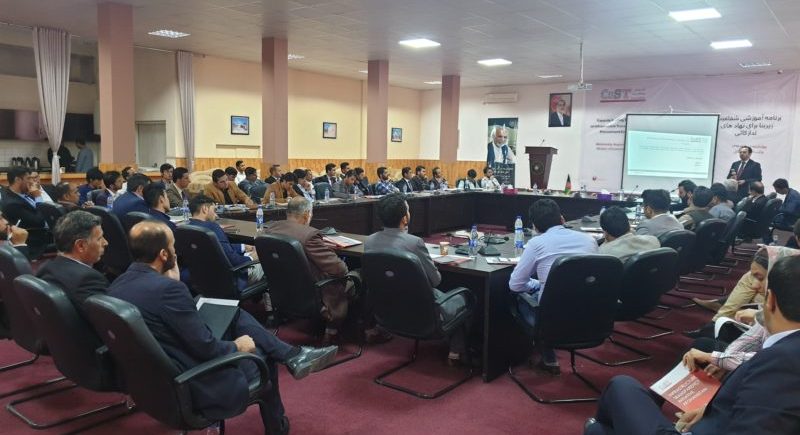CoST Afghanistan has continued its high-level programme of engagement with a one-day capacity building event in August at the Ministry of Economy in Kabul. The event was attended by 64 staff from 11 procuring entities, all of which have recently signed memorandums of understanding with CoST Afghanistan. Representatives from the National Procurement Authority, the Oversight Commission on Access to Information, and the Special Anti-Corruption Secretariat (SACS) all took part, delivering presentations on a variety of topics relating to transparency and accountability in publicly funded projects.
The event was held after memorandums of understanding were signed between CoST Afghanistan and the 11 procuring entities in February 2019. These procuring entities, including the Civil Aviation Authority, the Ministry of Education and the Ministry of Public Health, represent a cross-section of government activity and are responsible for funding a diverse range of public projects. The agreements formalise each procuring entity’s commitment to improving disclosure processes and increasing public engagement around the infrastructure projects they deliver.
In a positive development, any procuring entity which has signed a memorandum of understanding with CoST is now required to disclose data based on both the CoST Infrastructure Data Standard and the Open Contracting for Infrastructure Data Standard (OC4IDS) in the Afghanistan Government Electronic Procurement System (AEGOPS). This requirement was included in the anti-corruption action plans for procuring entities, which were recently developed by SACS. As such, this event was designed to build capacity with regards to using AGEOPS regularly and effectively.
Participants also developed plans on how to implement project identifiers – an innovative element of OC4IDS – in the infrastructure sector. Project identifiers allow citizens to track public investments, starting from when the project is first identified in a project pipeline or the national budget, through the project preparation phase and then during design, supervision and construction. Challenges and opportunities around implementation were discussed, and necessary recommendations made for the way ahead.
What’s next for CoST Afghanistan?
The event follows recent engagement with both the public and high-ranking government officials, most recently a university training event which was attended by over 300 students. CoST Afghanistan will conduct similar capacity building sessions for civil society and private sector, supporting both the supply and demand of information and ultimately increasing transparency and accountability in infrastructure sector.
